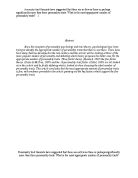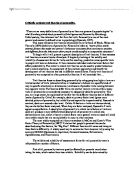and BFI-44 (John& Benet Martinez & John, 1988) results. This study will also show which personality traits are easier to judge, if this is correct extroversion should score highest in the self-stranger ratings with conscientiousness second and agreeableness third. This study could also show that neuroticism and openness to experience will not be significantly correlated as these are the hardest to judge.
Method
Participants
Twenty–one males and seventy–two females psychology students were recruited to participate in this study with an age range of eighteen to forty-four (M=20.86, SD=5.039) based on ninety-one participants as two individuals did not state their age. The age range was not recorded in the data to guarantee participants remained anonymous.
Materials
Each participant were required to complete a BFI-10(Rammstedt & John, 2007), (see appendix 1) which consisted of ten descriptive questions such as - I see this person as someone who is reserved, which were rated on a scale of one –five, one being that they disagree strongly and five being that they agree strongly, they were some questions which were negatively scored and this was then recoded by subtracting the score for reversed score items from six, for example if the score was a four then you would calculate 6-4 which gives you a recoded score of 2, which then becomes 4, (1 becomes 5, 2 becomes 4, 3 remains 3, 4 becomes 2 and 5 becomes 1), the average of the personality traits were then calculated for all reverse scored items (see appendix 3).
Design
The chosen design was correlation study as this was the most appropriate for the timescale and information required, the study looked at five personality variables – extroversion, neuroticism, agreeableness, openness to experience and conscientiousness as there is two measures of personality (BFI-10(Rammstedt & John, 2007) and BFI-44 (John& Benet Martinez & John, 1988)) there is ten variables with five correlations.
Procedure
Participants entered the room and were then allocated into pre-determined pairs, where the researcher pretended to have forgotten the hand outs and would need to return to the office to retrieve them, the researcher told students to chat to the person they were paired with while they did this. The researchers absence was timed at exactly five minutes to control thin slice exposure, upon return the researcher told them all to be quiet immediately and handed each participant a BFI-10(Rammstedt & John, 2007) questionnaire packet and were told to complete them for the individual they were paired with participants were given five minutes for this. The researcher then gave the participants the BFI-44(John et al, 1988) to complete and was instructed they were completing a personality test and were allowed fifteen minutes to complete this. Once this was complete the researcher informed the participants that it is vital that they do not speak to others about this study as it relies on first impressions.
Results
The overall aim of this study was to see if there is a relationship between a strangers rating of an individual’s personality and the individuals own rating of their personality by looking at the ‘big 5’ personality traits using the BFI-10(Rammstedt & John, 2007) and BFI-44(John et al, 1988).
Table 1
Correlation Coefficients between Self and Stranger Ratings of Big Five Personality Traits.
NOTE: self ratings were made using the BFI-44(John et al, 1988) and stranger ratings used the BFI-10 (Rammstedt & John, 2007).
The results show that a stranger can judge an individual’s personality accurately as there is positive correlation between the BFI-10(Rammstedt & John, 2007) and BFI-44 (John et al, 1988) results.
The correlations show that the prediction of extroversion (r(-2)=91, p=.471) is the easiest trait to judge with conscientiousness (r(-2)=91, p=.001) second and thirdly agreeableness(r(-2)=91, p=.063) is an inaccurate prediction as neuroticism (r(-2)=91, p=.121) is actually the second easiest to judge, the third hypothesis stated that target stranger rating agreement will not be significantly correlated for neuroticism (r(-2)=91, p=.121) and openness to experience(r(-2) =91, p=-.010) as they are the hardest to judge is accurate as this shows a small correlation.
Discussion
The first hypothesis formed for this study was; if a stranger can judge an individual’s personality accurately then there will be a positive correlation between the BFI-10(Rammstedt & John, 2007) and BFI-44 (John& Benet Martinez & John, 1988) results. The results showed that there is a positive correlation between four of the five personality traits. The second hypothesis stated that the study would show which personality trait would be easier to judge with extroversion scoring highest, conscientiousness second and agreeableness third, the results in fact showed this as inaccurate as neuroticism was actually second easiest to judge and conscientiousness was the hardest to judge. The third hypothesis stated that neuroticism and openness to experience will not be significantly correlated as these are the hardest to judge this is accurate as there is small correlation between them.
This coincides with previous research (Borkenau and Liebler 1993, Albright, et al 1988, Borkenau & Liebler 1992, Carney et al 2007) who also found that a stranger can make an accurate judgement of an individual’s personality in a short space of time.
There was issues with the methodology which would need to be addressed if similar research is to be carried out as participants were university student they may have seen each other around campus and without consciously realising formed an impression of the other, the individuals could also give a socially desirable response or act in a different manner and there is also the possibility that individuals may have spoken to their friends even though the researcher advised them not too, they could be addressed by asking people from different parts of the university where there is even less chance of people meeting or the actual study could take place at the very start of the term before people have had a chance to meet each other e.g. in fresher’s week.
Further research could be carried out by investigating first impressions on different cultures, this would be especially interesting as culture is now quite a controversial subject and society is very multicultural, age and gender could also be looked at to see if the older you are the better you are at judging a character, or that females have better intuitions than males when it comes to first impressions.
References
Albright, L. K. (1988). Consensus in Personality Judgements at Zero Acquaitance. Journal of Personality and Social Psychology , 55, 387-395.
Borkenau, P. &. (1993). Convergence of Stranger Ratings of Personality and Intelligence with Self Ratings, Partner Ratings and Measured Intelligence. Journal of Personality and Social Psychology , 65, 546-553.
Carney, D. C. (2007). A Thin Slice Perspective on the Accuracy of First Impressions. Journal of Research in Personality , 41, 1054-1072.
John, O. P., Donahue, E. M., & Kentle, R. L. (1991). The Big Five Inventory--Versions 4a and 54. Berkeley, CA: University of California, Berkeley, Institute of Personality and Social Research.
John, O. P., Naumann, L. P., & Soto, C. J. (2008). Paradigm shift to the integrative Big Five trait taxonomy: History, measurement, and conceptual issues. In O. P. John, R. W. Robins, & L. A. Pervin (Eds.), Handbook of personality: Theory and research (pp. 114-158). New York, NY: Guilford Press.
Rammstedt, B. &. (2007). Measuring Personality in one minute or less: A 10 item short version of the big five inverntory in english and german. Journal of Researchin Personality , 41, 1054-1072.
Appendix 1
Participant # _____ Target # ______
How well do you think the following statements
describe the person you were just talking to?
I see this person as someone who… Disagree Disagree Neither Agree a Agree
Strongly a little agree nor little strongly
…is reserved (1) (2) (3) (4) (5)
…is trusting (1) (2) (3) (4) (5)
…is lazy (1) (2) (3) (4) (5)
…is relaxed, handles stress well (1) (2) (3) (4) (5)
…is likely to have few artistic interests (1) (2) (3) (4) (5)
…is outgoing, sociable (1) (2) (3) (4) (5)
…tends to find fault with others (1) (2) (3) (4) (5)
…is likely to do a thorough job (1) (2) (3) (4) (5)
…gets nervous easily (1) (2) (3) (4) (5)
…has an active imagination (1) (2) (3) (4) (5)
Your Name______________________________
Age____________________________________
Sex: MALE / FEMALE
Workshop group__________________________
Appendix 2
Participant #_______ How I am in general Target’s # __________
Here are a number of characteristics that may or may not apply to you. For example, do you agree that you are someone who likes to spend time with others? Please write a number next to each statement to indicate the extent to which you agree or disagree with that statement.
I am someone who…
- _____ Is talkative
- _____ Tends to find fault with others
- _____ Does a thorough job
- _____ Is depressed, blue
- _____ Is original, comes up with new ideas
- _____ Is reserved
- _____ Is helpful and unselfish with others
- _____ Can be somewhat careless
- _____ Is relaxed, handles stress well.
- _____ Is curious about many different things
- _____ Is full of energy
- _____ Starts quarrels with others
- _____ Is a reliable worker
- _____ Can be tense
- _____ Is ingenious, a deep thinker
- _____ Generates a lot of enthusiasm
- _____ Has a forgiving nature
- _____ Tends to be disorganized
- _____ Worries a lot
- _____ Has an active imagination
- _____ Tends to be quiet
- _____ Is generally trusting
- _____ Tends to be lazy
- _____ Is emotionally stable, not easily upset
- _____ Is inventive
- _____ Has an assertive personality
- _____ Can be cold and aloof
- _____ Perseveres until the task is finished
- _____ Can be moody
- _____ Values artistic, aesthetic experiences
- _____ Is sometimes shy, inhibited
- _____ Is considerate and kind to almost everyone
- _____ Does things efficiently
- _____ Remains calm in tense situations
- _____ Prefers work that is routine
- _____ Is outgoing, sociable
- _____ Is sometimes rude to others
- _____ Makes plans and follows through with them
- _____ Gets nervous easily
- _____ Likes to reflect, play with ideas
- _____ Has few artistic interests
- _____ Likes to cooperate with others
- _____ Is easily distracted
- _____ Is sophisticated in art, music, or literature
Appendix 3
SCORING INSTRUCTIONS
To score the BFI, you’ll first need to reverse-score all negatively-keyed items:
Extraversion: 6, 21, 31
Agreeableness: 2, 12, 27, 37
Conscientiousness: 8, 18, 23, 43
Neuroticism: 9, 24, 34
Openness: 35, 41
To recode these items, you should subtract your score for all reverse-scored items from 6. For example, if you gave yourself a 5, compute 6 minus 5 and your recoded score is 1. That is, a score of 1 becomes 5, 2 becomes 4, 3 remains 3, 4 becomes 2, and 5 becomes 1.
Next, you will create scale scores by averaging the following items for each B5 domain (where R indicates using the reverse-scored item).
Extraversion: 1, 6R 11, 16, 21R, 26, 31R, 36
Agreeableness: 2R, 7, 12R, 17, 22, 27R, 32, 37R, 42
Conscientiousness: 3, 8R, 13, 18R, 23R, 28, 33, 38, 43R
Neuroticism: 4, 9R, 14, 19, 24R, 29, 34R, 39
Openness: 5, 10, 15, 20, 25, 30, 35R, 40, 41R, 44
Scoring the BFI-10
Extraversion = Item 1 (reversed) plus item 6
Agreeableness = Item 2 plus item 7 (reversed)
Conscientiousness = Item 3 (reversed) plus item 8
Neuroticism = Item 4 (reversed) plus item 9
Openness to experience = item 5 (reversed) plus item 10








